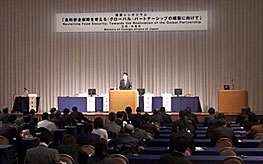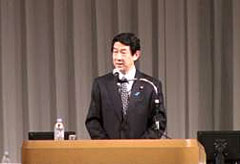(Translation, Original: Japanese)
International Symposium "Revisiting Food Security: Towards the Realization of a Global Partnership"
March 5, 2009, New Takanawa Prince Hotel
Keynote Address by Mr. Shintaro Ito, State Secretary for Foreign Affairs of Japan


Ladies and gentlemen,
I would like to extend a warm welcome to all of you. I would also like to take this opportunity to express my sincere gratitude to the Honorable Dr. Soares Bonhaza Nhaca, Minister of Agriculture of Mozambique, and the Honorable Dr. Ken Diston Lipenga, Minister of Economic Planning and Development of Malawi, as well as other distinguished panelists, who have come all the way here to attend this event.
Purpose of this symposium
Around this time last year, soaring food prices, coupled with escalating oil prices, caused the spread of hunger as well as political and social crises in many developing countries, attracting attention as a major global issue. I am concerned about the fact that as food prices are falling, the international community's interest in the food crisis is declining rapidly, especially in rich countries, including Japan. Furthermore, the declining interest in the food crisis is exacerbated by the financial and economic crisis that is gripping the world now. I say this because the food crisis is not yet over in many developing countries. In fact, the world's hungry and malnourished population is rising. Experts estimate that it is now close to one billion. The world is thus deviating from the target of halving the population of people who suffer from hunger by 2015 as set under the Millennium Development Goals (MDGs).
Although recovery in the global economy is the greatest challenge facing the international community at present, there is serious concern that food prices may rebound and surpass last year's levels once the global economy recovers. Moreover, the fundamentals affecting the food balance are worsening, including an increasing population, changing dietary habits, climate change, growing water stress, and degrading soil. All these factors are making the prospects for global food supplies extremely uncertain.
The food crisis calls for a comprehensive and inclusive response as it is a complex issue resulting from the inter-relationship between nature and human activity that involves such factors as the environment, energy, population, trade and finance. As the G8 leaders stressed at the Hokkaido Toyako Summit, we urgently need to form a global partnership on agriculture and food involving all stakeholders, including the private sector and civil society as well as governments. A good relationship between nature and human activity calls for coexistence, contentment (knowing when one has enough), and the spirit of moderation. Japan, which is small in area but large in population, has developed these values. I believe that these important values are relevant to tackling the global food crisis as well.
This symposium is built on such concerns and beliefs. To stimulate multifaceted discussions, the Ministry of Foreign Affairs of Japan has invited high-level officials with different backgrounds who are playing an active role in the international arena.
The title of this symposium, "Revisiting Food Security," has its own implications. The phrase "food security," when used in an international arena, usually brings to mind the issue of food shortage or poverty in developing countries. Discussions on food security in Japan, on the other hand, tend to focus on Japan's own declining self-sufficiency in food. It is essential, however, that Japan takes the perspective that contributing to tackling the global food crisis helps strengthen the country's food security. This is because food security of the world and that of Japan are inextricably linked. It is necessary to remember that a stable supply of food for Japan is not possible without giving consideration to environmental conservation and the notion of cultivating crops that best suit local conditions, as well as increasing the production of and investment in sustainable agriculture on a global scale and strengthening international market and trade systems.
Japan's policy directions
I believe that one of the important goals of Japan's diplomacy is to develop rules and models that enable a harmonious coexistence and development of the world or that allow all countries and individuals to pursue equitable and balanced economic development and conserve the global environment simultaneously. With this consideration, let me clarify three points regarding future directions Japan will take in tackling food issues for Japan and the world.
First, Japan will continue to help the world to boost food production and improve agricultural productivity as the world's largest donor in the agricultural sector. Japan accounts for some 30 percent of the DAC countries' total amount of assistance in this sector. In extending such assistance, Japan will maintain and promote the basic idea of achieving sustainable production that does not harm the environment, by respecting traditional farming and diets in each area of the world and promoting -- on a global scale -- the cultivation of crops that best suit local conditions. Also important are water availability and soil quality. Although water is gaining in importance in terms of development, similar interest should be directed to soil improvement as well. Japan intends to raise these issues at international forums in the future
Second, Japan will propose the development of public-private partnership models for promoting foreign agricultural investment as a new policy direction. Behind this idea is our awareness of the need to rectify the current situation of insufficient agricultural investment, especially in developing countries, due to the huge risk factors involved, including the weather. The limited availability of public funds highlights the need to mobilize private funds in a more creative manner. It is important to ensure that adequate funds and technologies are provided where they are needed, in a timely manner through partnerships among the agricultural, commercial, and industrial sectors. We believe that private investment in the agricultural sector will be promoted if investing countries take some of the risks from the private sector through public-private partnerships for foreign agricultural investment. We recognize the importance of supporting private investment in agriculture by promoting such an approach internationally. In other words, what is needed now is to build a win-win relationship between investing countries and host countries and promote foreign agricultural investment so that benefits will be shared by both countries. Business models should be developed to expedite this. To that end, Japan intends to work with the United Nations, FAO, WFP, UNICEF, and other international institutions, as well as partner countries. We wish to make it clear here that we have a strong will to make intellectual contributions in the form of presenting a new paradigm, in addition to providing funds and supplies.
Third, a more robust and sustainable system of agricultural production in Japan, the largest food importer in the world, would provide a significant contribution to global food security. We will support agricultural reforms to that end.
Conclusion
Let me conclude my speech by reiterating that addressing food issues requires a holistic understanding and approach that encompasses many factors ranging from the environment, water and energy to culture, history, and lifestyle. It is no coincidence that eradicating poverty is part of the first MDG and considered the basis of human security. Solving food problems is the most fundamental need and challenge for human beings as they maintain their dignity, engage in healthy and productive activities and control their own fate. I sincerely hope that candid and open discussions in this symposium will raise awareness about various issues concerning food, provide new insights, and broaden the possibilities for solving the problems.
Thank you for your kind attention.
Back to Index
